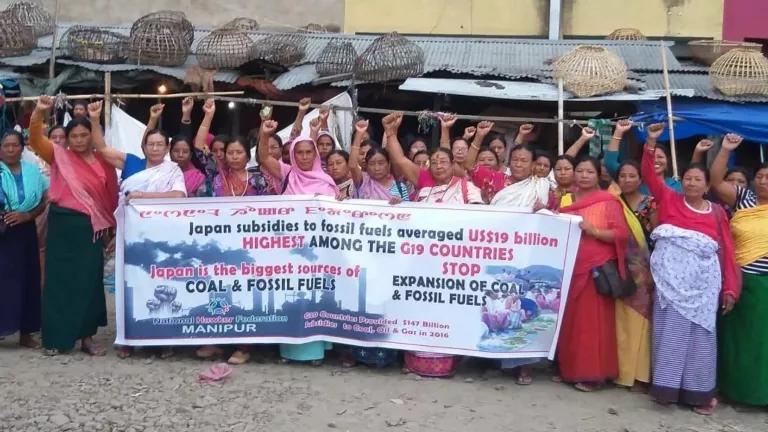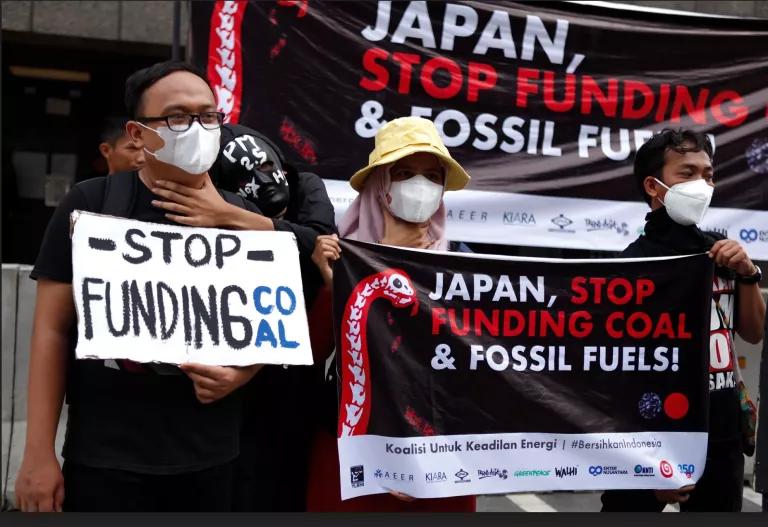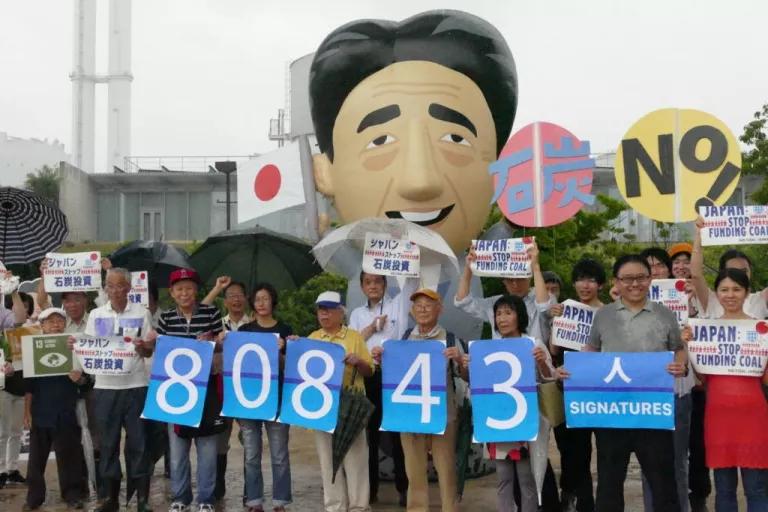Japan G20 Lacked Ambition on Climate Change & Coal Phaseout

This blog was co-written with Claire Wang.
Leading up to the 2019 G20 summit in Osaka, Japanese Prime Minister Shinzo Abe promised “firm leadership” and “disruptive innovation” on climate change. But the G20 organized by Japan did not deliver on this urgent issue.
Mentions of climate change in this year’s G20 communique are similar to previous summits—a two-paragraph blurb where 19 countries of the G20 affirmed the “irreversibility” of the Paris Accord while the US alone tried to justify its withdrawal. This return to tired, unambitious language on climate is particularly alarming given the onslaught of climate crises in the past year. These include a record heat wave that swept through Europe while the summit took place, as well as major disasters in Japan in 2018, such as record-level rains that caused over 220 deaths from flooding and landslides, and a two-week heat wave that killed over 1,000 people in 2018.
Despite the climate costs Japan has already suffered, its own climate policies are woefully out of date. Prior to the G20 summit, Japan released an uninspiring long term climate strategy that is severely out of line with climate needs, along with watered down language on climate in the draft G20 communique. Japan’s plans for domestic coal expansion and international coal finance continue to draw international criticism, since OECD countries should be phasing out of coal by 2030. The G20 as a whole has also dramatically expanded coal finance, spending at least $63.9 billion on coal per year, despite committing a decade ago to phase out fossil fuel subsidies.
With Japan providing no leadership on real decarbonization, thousands of activists mobilized during the G20 summit in protest of Japan and G20 climate policy to call for true leadership on climate and clean energy. As the 3rd largest economy and 6th largest contributor to cumulative carbon emissions, Japan must drastically revise its climate stance to eliminate coal and ramp up support for renewable energy.
Japan’s Weakened Long Term Strategy
Two weeks before the G20 summit, Japan’s cabinet adopted its Long Term Strategy on climate change as part of its commitments under the Paris Agreement. The Strategy seeks to achieve net zero emissions in the second half of the century, but does not set a specific date by which to meet this target. It also maintains Japan’s existing goal to cut emissions 80% by 2050, without specifying a baseline from which to measure emissions reductions. By delaying its net-zero target until after the middle of the century, Japan remains inconsistent with a 1.5C warming limit, which requires reaching net zero emissions by 2050.
Japan’s energy policy has been the most concerning area of its climate behavior, as its Long Term Strategy does not provide any plan to phase out coal even in the long term, and relies heavily on expensive strategies such as carbon capture and sequestration instead of renewables, which would only perpetuate fossil fuel dependency. Since 2012, Japan proposed 50 new coal plants totaling 23,000 MW. Of these, 12 plants are now operational, 15 are currently under construction, and 10 are still in the pipeline. The 13 plants that have been canceled since 2012 illustrate the increasing unprofitability of coal and shrinking electricity demand, which could leave Japan with $61-80 billion worth of stranded coal assets. Still, Japan’s energy plans include only a 22-24% renewables target by 2030, which the Long Term Strategy failed to increase.
According to Yuri Okubo, senior researcher with the Renewable Energy Institute in Tokyo, the goverments response on climate change was mainly to focus on "disruptive innovation" which is "often used as an excuse to avoid the implementation of reduction measures by technologies that can be used immediately.” She also warned that: “If Japan still aims to [receive] a quarter of its power source from coal by 2030 and does not revise its low renewable energy target, Japan will not be seen as taking a serious stance on tackling climate change.”
Global Criticism of Japan’s Coal Finance and Lack of Climate Leadership at the G20
Japan’s involvement in coal received significant scrutiny in the lead-up to the G20 summit. Within the G20, Japan is the second-largest source of public coal financing after China, spending $15 billion from 2013 to 2018 on coal plants and mines. Japan also drew criticism for its watered-down draft G20 communique, which included only a passing reference to climate change buried among a litany of other global issues. The draft failed to mention decarbonization of the global economy, nor did it reference any temperature limits on global warming, in a stark deviation from past years’ communiques and a far cry from the climate leadership Abe pledged.
Before and during the G20 summit, over a dozen grassroots mobilizations in 9 different countries mobilized thousands of activists to protest Japanese coal investments and G20 countries’ continued support of fossil fuels. These actions include, among others:
In India, 20,000 people protested across 8 states and 75 cities calling on the G20 to end fossil fuel subsidies and take urgent action on climate change.
In Australia and Indonesia, activists protested outside Japanese Embassies to protest Japanese coal and fossil fuel funding.

In the Philippines, women led protests under the banner “Women Rise for Climate Justice” called on Japan to end coal finance.

Photo courtesy of Asian Peoples' Movement on Debt and Development (APMDD) and Philippines Oriang Women
In Washington, DC, a petition signed by over 80,000 people was delivered to the Japanese Embassy urging Japan to end support for coal. In the photo below, activists in Japan pose with the final signature count of the coal petition.

Photo courtesy of 350 Japan
In Japan, protesters gathered at the Kobe coal power plant, and at the site of the proposed Yokosuka coal plant in Osaka.

Looking Ahead to the G20 Summit in 2020
As the urgency of climate change grows clearer with each coming crisis, the G20’s inability to raise the ambition of climate policies is not merely irresponsible—it’s an existential threat. Japan has missed this opportunity to bring together G20 nations on the goal of eliminating public finance for coal and achieving the phase-out of fossil fuel subsidies, as promised ten years ago. Japan should revise its domestic energy policies to increase the deployment of renewables and phase out the use of coal. Furthermore, it should end all overseas financing for coal plants and mines, to avoid the lock-in of dirty, polluting energy abroad. By the time world leaders meet for the next summit in Riyadh, they must dramatically ratchet up ambition and action on climate.
